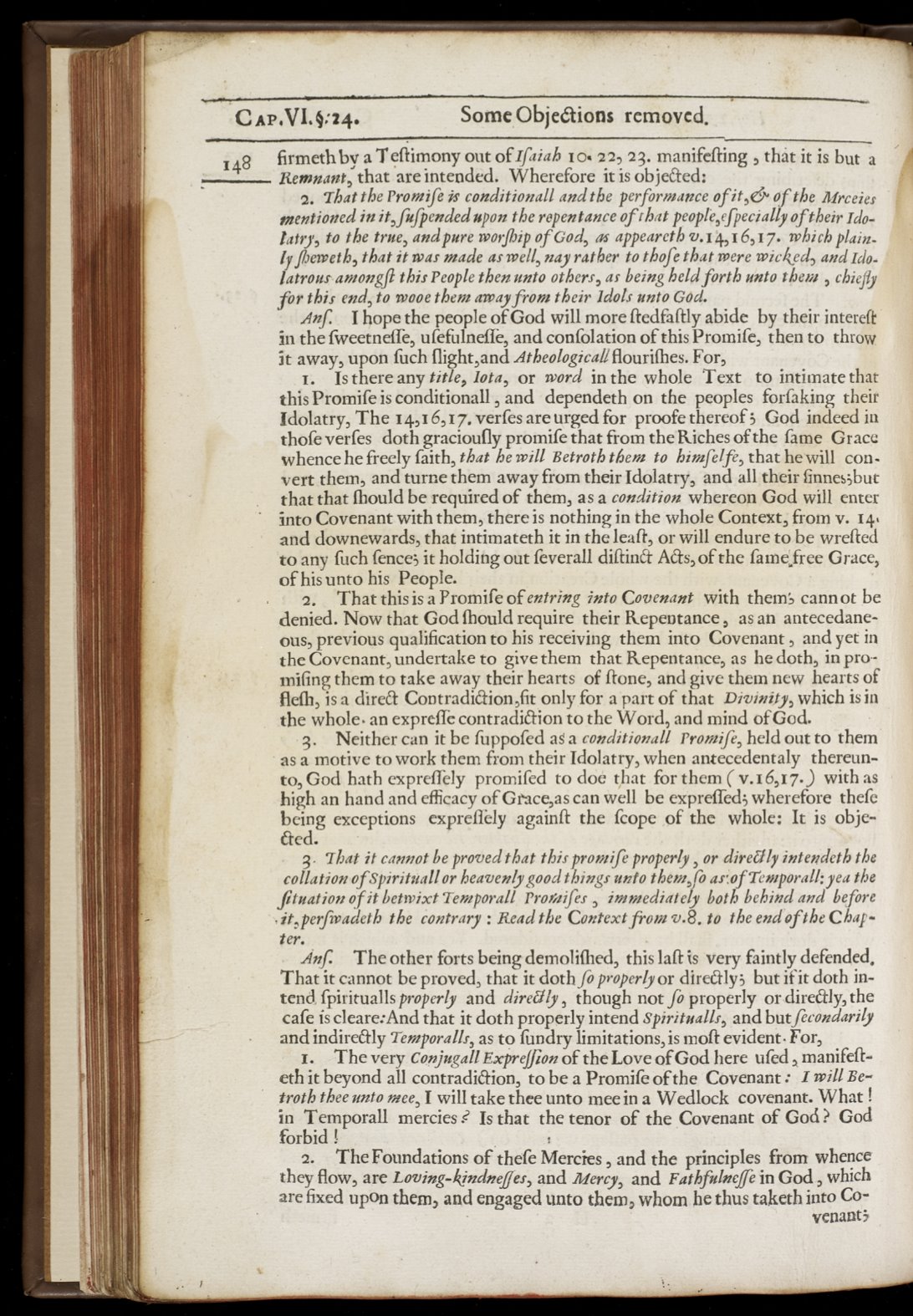

Cer
An.
4:14
Some Obje&ions removed.
148
firmethby
a
Teflimony out
ofifalah
to.
22,
23.
manifefting ,
that
it
is
but
a
Remnant,
that
are intended. Wherefore
it
is
obje&ed:
2.
That the
Promife is
conditionall and the
performance
ofit,&
of
the
11lrceies
mentioned
in
it,
fufpended
upon
the repentance
of
that
people,efpecially
oftheir
Ido-
latry,
to the
true,
and
pure
worfhip
of
God,
a
appeareth
o.14,16,17.
which plain-
ly
fheweth,
that
it
was
made as
well,
nay
rather
to
thofe
that
were
wicked, and
Ido-
latrous. amongfi
this
People
then
unto
others, as
being
held
forth
unto
them ,
chiefly
for
this
end, to
wove
them
away
from their
Idols unto
God.
Anf.
I hope
the
people
of
God
will
more
fledfafrly
abide by their
interefI
in the
fweetneffe, ufefulneffe,
and confolation
of
this
Promife, then
to
throw
it
away, upon
fuch
flight,and
Atheologicall
flourithes.
For,
1.
Is
there
any
title,
Iota,
or
word
in
the
whole
Text to
intimate
that
this Promife
is
conditionall
,
and dependeth on the
peoples
forfaking their
Idolatry,
The
14,16,17.
verfes are urged
for
proofe
thereof;
God indeed
in
thofe verfes
doth
gracioufly promife
that
from
the
Riches
of
the
fame
Grace
whence he freely faith, that
he
will
Betroth them
to
himfel
fe,
that
he will
con.
vert
them, and
turne
them away from
their Idolatry,
and
all
their
finnes;but
that
that
Ibould be
required
of
them,
as a condition
whereon God
will
enter
into Covenant with
them,
there
is
nothing
in
the
whole
Context,
from
v.
14,
and
downewards,
that intimateth it
in
the leaf., or
will
endure
to
be
wrefted
to
any fuch
fence;
it
holding out
feverall diflin&
Ads,
of
the famefree
Grace,
of
his
unto
his
People.
a.
That
this
is
a
Promife
of
entring into Covenant
with
them; cannot be
denied. Now
that
God
Ihould require
their Repentance,
as
an antecedane-
ous, previous qualification
to
his
receiving
them into Covenant
,
and
yet
in
the Covenant, undertake
to
give
them
that
Repentance,
as
he
Both,
in
pro-
tnifing
them
to take
away
their
hearts
of
frone, and give them new hearts
of
flefh,
is
a dire&
Contradifrion,fit only
for
a
part
of
that
Divinity, which
is
in
the
whole.
an expretfe
contradi
&ion
to
the Word,
and mind
of
God.
3.
Neither
can
it be fuppofed
as a
conditionall
Promife,
held out
to
them
as a
motive
to
work them from their
Idolatry,
when antecedentaly
therein-
to,
God bath
expreffely
promifed to
doe
that
for them
(v.16,17.)
with
as
high an hand and
efficacy
of
Gtace,as
can well
be expreffed;wherefore
thefe
being
exceptions expreffely againft
the
fcope
of
the
whole:
It
is
obje-
&ed.
3.
That
it
cannot
be
proved
that
this promifeproperly,
or direelly
inten
Beth
the
collation
ofspirituall
or
heavenlygood
things
unto them,fo
asof
Temporalk
yea
the
fituation ofit
betwixt
Temporall Proraifes
,
immediately
both
behind and
before
it,
perfwadeth the contrary
:
Read the Context
from v.8.
to the end
of
the
Chap-
ter.
Anf.
The
other
forts being demolithed,
this laft
is
very faintly
defended.
That
it
cannot be proved,
that
it
doth
fo
properly
or
direly;
but
if
it
cloth
in-
tend
fpiritualls
properly
and direilly, though not
fo properly
or,dire&ly,
the
cafe
is
cleare:And
that it doth
properly intend spiritually,
and
butfecondarily
and
indire&ly
Temporalis, as
to
fundry limitations,
is
moil evident. For,
s.
The
very
Conjugal.ExpreJfion
of
the
Love
of
God
here
ufed,
manifefl-
eth
it
beyond
all contradiCtion,
to
be
a
Promife
of
the
Covenant:
I
will
Be-
troth
thee
unto
mee,
I
will
take thee unto
mee
in
a
Wedlock covenant.
What
!
in
Temporal. mercies?
Is
that
the tenor
of
the
Covenant
of
God?
God
forbid
!
2.
The
Foundations
of
thefe
Mercies
, and
the
principles
from
whence
they
flow,
are
Loving-
kindneíJes,
and
Mercy,
and
Fathfuineffe
in
God.,
which
are
fixed
upon
them,
and engaged
unto them,
whom he thus
taketh
into Co-
venant;










